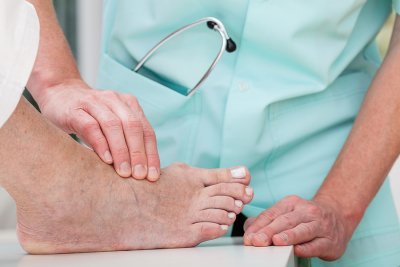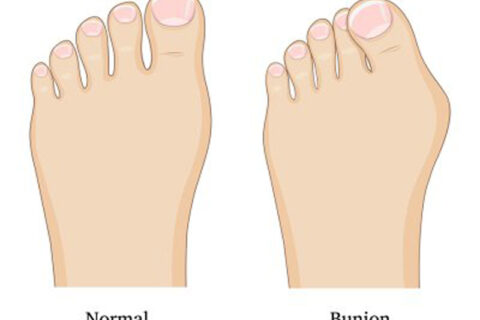Overlapping Toes Due to Bunions
Overlapping Toes Due to Bunions
When bunions pop up, they can be a painful nuisance. But what happens when they cause overlapping toes? The second toe, in particular, can overlap the big toe, and this is associated with bunions. The experts at Advanced Foot and Ankle Specialists in Sugar Land, TX, can give you answers about what causes this condition, how to treat it, and how to keep it from happening again.

Overlapping Toes Due to Bunions
Bunions can be an annoyance, but they can also cause more problematic issues. Sometimes, bunions can cause the toes to overlap. Overlapping toes can cause even worse problems. Here are some examples of issues caused by overlapping toes
- Blisters
As toes overlap, they can rub together and cause blisters. Additionally, overlapping toes can cause shoes to fit differently than they usually would, which can lead to serious blister problems. - Calluses
When friction and irritation continue due to overlapping toes and ill-fitting shoes, calluses can grow. This means that recovery becomes even more complicated. - Balance Issues
When toes overlap, many individuals change how they stand or walk. This can lead to balance issues as the individual begins to stand or walk unnaturally. - Difficulty with Shoes
Overlapping toes can make it very challenging to find shoes that fit. Consequently, individuals with overlapping toes wear ill-fitting shoes and suffer from pain. - Issues with Gait
To this effect, gait can also become altered as individuals walk with overlapping toes. These patients try to compensate for their balance and overlapping toe problems, and consequently, their gait is affected. Unfortunately, this can lead to back issues and more. - Pain and Stiffness
When individuals with overlapping toes wear shoes, they experience pain and stiffness from the pressure of the shoe. This pain makes it difficult to walk or stand for prolonged periods.
What are Bunions?
What are bunions, and how are they formed? Bunions have one outstanding characteristic. This is the presence of a bony bump at the base of the big toe. Bunions occur when the big toe shifts towards the second toe, pushing the joint outward and creating a visible bump on the side of the foot. Over time, bunions can lead to various foot deformities, including overlapping toes. Bunions can be caused by wearing shoes that don’t fit (are too small) and by certain lifestyle conditions. Some of these conditions include standing for prolonged periods, wearing high heels, genetics, and being overweight or obese.
Understanding Overlapping Toes
Overlapping toes could be a severe problem. However, finding the right treatment plan can be a game changer. Bunions can be treated by working with a foot specialist. However, they must be appropriately diagnosed, and a strict treatment plan must be in place.
Diagnosing Bunions and Overlapping Toes
- Self-Diagnosis
When self-diagnosing bunions, there are some key features to look for.- a Visible Bump
- Pain
- Toe Deviation
- Issues Finding Shoes that Fit
- Swelling
- Professional Diagnosis
Your foot doctor can tell you for sure if you have a bunion. A professional diagnosis is a great way to receive treatment and be on your way to a bunion-free life.
Treatment Options for Bunions and Overlapping Toes
When you discover that you have bunions and overlapping toes, you should seek treatment as soon as possible.
- Conservative Treatments
Orthotics can be used to separate toes and alleviate foot pain. Once a physician corrects the spacing of the toes, other devices such as tape or splints can be used to straighten the toe. - Medical Treatments
If conservative treatments don’t work, a doctor may recommend a specific shoe. Some other treatments may include over-the-counter pain relievers and corticosteroids. - Surgical Options
If pain persists or non-surgical treatments aren’t effective, it may be time for a surgical option. Some surgeries performed to treat bunions are tendon and ligament repair, fusion, or osteotomy, which involves partial or total bone removal.
Preventing Bunions and Overlapping Toes
If you are genetically predisposed to have bunions and overlapping toes, you may want to take these preventive measures.
- Footwear Choices
Make sure that you consistently wear shoes that fit correctly. Wearing ill-fitting shoes can lead to bunions and toe overlap. Be cautious with high heels and other styles of shoes that put unnecessary pressure on the foot and toes. - Foot Care Practices
Keep your feet clean and practice good hygiene. - Lifestyle Adjustments
Maintain a healthy weight and practice exercises of the foot to strengthen the muscles of the foot and toes.
When to See a Specialist
When you’ve made lifestyle changes, and your bunions have not changed, it’s time to seek treatment from a specialist. A foot doctor, like a podiatrist or chiropodist, can assess your situation and make the appropriate suggestions to help you get much-needed treatment.
Conclusion
Nobody wants to deal with bunions. But there are solutions. Contacting a foot specialist is vital to having your bunions treated, removed, or corrected.
Contact us today!
In the Sugar Land, Texas, area, finding the right foot and ankle doctor is as simple as contacting the team at Advanced Foot and Ankle Specialists. Dr. Lee and his expert team will help you maintain your feet so that they remain healthy and strong. With in-house X-ray, ultrasound, shockwave, and laser technology, we are your one-stop shop for proper foot care. For more information or to schedule an appointment, contact us or visit our website.

